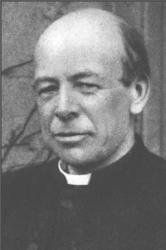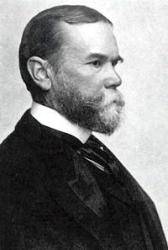Planning worship?
Check out our sister site, ZeteoSearch.org,
for 20+ additional resources related to your search.
- |
User Links
Person Results
‹ Return to hymnal





Export as CSV
Henry Scott Holland

1847 - 1918 Hymnal Number: 96 Author of "Judge eternal, throned in splendor" in Social Hymns of Brotherhood and Aspiration Holland, Henry Scott, D.D., son of G. H. Holland of Gayton Lodge, Wimbledon Common, was born Jan. 27, 1847, at Ledbury, Hereford, and educated at Eton and at Balliol Coll., Oxford (B.A. 1870, M.A. 1873, D.D. Aberdeen 1903). He became Senior Student of Christ Church, Oxford, in 1870, was ordained D. 1872, P. 1874, and has been Canon of St. Paul's, London, since 1884. His hymn, "Judge eternal, throned in splendour" (Prayer for the Nation), appeared in the Commonwealth for July 1902, and is in The English Hymnal, 1906, No. 423. [Rev. James Mearns, M.A.]
--John Julian, Dictionary of Hymnology, New Supplement (1907)
Henry Scott Holland
Alfred Tennyson, Baron Tennyson

1809 - 1892 Person Name: Alfred Tennyson Hymnal Number: 44 Author of "Ring out, wild bells, to the wild sky" in Social Hymns of Brotherhood and Aspiration Tennyson, Alfred, Lord, son of the Rev. G. C. Tennyson, Rector of Somersby, Lincolnshire, was born at Somersby, Aug. 6, 1809; educated at Trinity College, Cambridge; appointed Poet Laureate in 1850, and raised to the Peerage in 1884. Although Lord Tennyson has not written any hymns, extracts from his poems are sometimes used as such, as "Strong Son of God, immortal Love" (Faith in the Son of God), from the Introduction to his In Memoriam, 1850; the well-known "Too late, too late, ye cannot enter now," and others. The former is sometimes given as "Spirit of immortal Love," and again as "Eternal God, immortal Love."
--John Julian, Dictionary of Hymnology, Appendix, Part II (1907)
Alfred Tennyson, Baron Tennyson
Henry Warburton Hawkes
1843 - 1917 Hymnal Number: 40 Author of ""Thy kingdom come!" O Lord, we daily cry" in Social Hymns of Brotherhood and Aspiration Hawkes, Henry Warburton, born at Kendal, 1843, for sixteen years minister of the North End Mission, Liverpool, from 1891 to 1900 of the Bootle Free Church, since 1906 of West Kirby Free Church. Editor of Hymns of Help and Songs of Praise, 1882; and Hymns and Sacred Songs for Church and Home. 1891, Reprinted and enlarged, 1898. The edition of 1898 has about 100 of his own hymns and adaptations for popular tunes.
1. Amid the din of earthly strife. Vision of the Christ.
2. Father, Thy dear name we own. Litany.
3. Heavenward lift your banners. Christian Warfare.
4. Peace, perfect peace, the gift of God within. Inward Peace.
5. Thank we now the Lord of heaven. Christmas.
6. Thou knowest, Lord! Thou know'st my life's deep story. The Searcher of Hearts.
No. 3 published 1882; 1, 2, 4, 5 published 1891; 6 published 1898.
[Rev. James Mearns, M.A.]
--John Julian, Dictionary of Hymnology, New Supplement (1907)
Henry Warburton Hawkes
Frederick J. Gillman
1866 - 1949 Person Name: F. J. Gillman Hymnal Number: 104 Author of "God send us men whose aim 'twill be" in Social Hymns of Brotherhood and Aspiration Born: February 25, 1866, Devizes, Wiltshire, England.
Died: February 18, 1949, Beaconsfield, Buckinghamshire, England.
Raised in the Congregationalist denomination, Gilman helped edit the 1909 & 1933 Fellowship Hymn-Book from the National Adult School Union and the Brotherhood Movement. His other works include:
Songs and Singers of Christendom, 1911
The Story of Our Hymns, 1921
The Evolution of the English Hymn (New York: The Macmillan Company, 1927)
--www.hymntime.com/tch/
Frederick J. Gillman
John Hay

1838 - 1905 Hymnal Number: 32 Author of "Not in dumb resignation" in Social Hymns of Brotherhood and Aspiration Hay, John, diplomat and author, born at Salem, Ind., Oct. 8, 1838; graduated at Brown University 1858; admitted to the 111. Bar; was private secretary to Pres. Lincoln; served in the Civil War; member of the Legation at Paris, Madrid, and Vienna, and Ambassador at the Court of St. James. In 1879-81 he was First Assistant Sec. of State, and from 1898 Sec. of State in the Cabinets of Presidents McKinley and Roosevelt, to his death July 1, 1905. His publications included Castilian Days, 1871; and, with J. G. Nicolay, Abraham Lincoln: A History, 10 vols., 1887, &c. In 1871 he also published Pike County Ballads, and in 1890 Poems. Of his poems the following are in common use as hymns:—
1. From Sinai's cloud of darkness. [Law and the Gospel.] This begins with st. ii. of his poem, “Sinai and Calvary," in Poems, 1890, p. 152. Asked for its date and origin, Mr. Hay said: "I wrote the hymn several years ago, because I felt like it. I can say nothing more intelligible than that." It was included iu the New Laudes Domini, N.Y., 1892.
2. Lord, from far-severed climes we come. [Work on for God.] In the summer of 1895, at his summer home at Lake Sunapee, Mr. Hay was asked to write a hymn for the opening of the 15th International Christian Endeavour Convention, at Washington, the following year, but declined on the ground that his verse-writing days were past. But in the following spring he sent this hymn, with the statement that there was no obligation to use it. In his manuscript it is entitled "An Invocation." It was sung at the opening of the Convention of 1896, and again at the Convention on July 4, 1905, when the opening exercises assumed the form of a memorial service, as his body was being borne to the grave. It is in several American collections. In The Methodist Hymnal, N.Y., 1905, it opens with st. ii., “Defend us, Lord, from every ill." The original is in 4 stanzas of 4 lines.
3. Not in dumb resignation. [Submission.] Appeared in 3 stanzas of 8 lines in Harper's New Monthly Magazine, Oct. 1891, and entitled "Thy will be done." Given with alterations in Dr. L. Abbott's Plymouth Hymnal, N.Y., 1894.
Mr. Hay was for some time an office-bearer in the Presbyterian Church of the Covenant, Washington, D.C. [Rev. L. F. Benson, D.D.]
--John Julian, Dictionary of Hymnology, New Supplement (1907)
John Hay
H. S. Cutler

1825 - 1902 Person Name: Henry S. Cutler Hymnal Number: 13 Composer of "ALL SAINTS" in Social Hymns of Brotherhood and Aspiration Henry Stephen Cutler (b. Boston, MA, 1824; d. Boston, 1902) studied music in Frankfurt, Germany, in 1844. He moved to England, where he listened with interest to the cathedral choirs and came under the influence of the Oxford Movement. Returning to Boston in 1846, Cutler became organist of the Episcopal Church of the Advent and formed a choir of men and boys, to whom he introduced the wearing of liturgical robes. When he took a position at Trinity Church in New York City, he removed women from the choir and used the occasion of a visit by the Prince of Wales to the church to introduce his newly vested men and boys' choir. He also moved the choir from the gallery to the chancel and initiated the chanting of the psalms and the singing of part of the worship service. Cutler compiled The Psalter, with Chants (1858) and published The Trinity Psalter (1864) and Trinity Anthems (1865).
Bert Polman
H. S. Cutler
Robert Simpson
1790 - 1832 Hymnal Number: 85 Arranger of "BALERMA" in Social Hymns of Brotherhood and Aspiration Robert Simpson, of Scotland; b. 1790; d. 1832
Evangelical Lutheran Hymnal, 1908
Robert Simpson
Constance Mills Herreshoff
Hymnal Number: 6 Composer of "CONSTANCE" in Social Hymns of Brotherhood and Aspiration
Constance Mills Herreshoff
Thomas Tallis

1505 - 1585 Person Name: T. Tallis Hymnal Number: 26 Composer of "TALLIS' CANON" in Social Hymns of Brotherhood and Aspiration Thomas Tallis (b. Leicestershire [?], England, c. 1505; d. Greenwich, Kent, England 1585) was one of the few Tudor musicians who served during the reigns of Henry VIII: Edward VI, Mary, and Elizabeth I and managed to remain in the good favor of both Catholic and Protestant monarchs. He was court organist and composer from 1543 until his death, composing music for Roman Catholic masses and Anglican liturgies (depending on the monarch). With William Byrd, Tallis also enjoyed a long-term monopoly on music printing. Prior to his court connections Tallis had served at Waltham Abbey and Canterbury Cathedral. He composed mostly church music, including Latin motets, English anthems, settings of the liturgy, magnificats, and two sets of lamentations. His most extensive contrapuntal work was the choral composition, "Spem in alium," a work in forty parts for eight five-voice choirs. He also provided nine modal psalm tunes for Matthew Parker's Psalter (c. 1561).
Bert Polman
Thomas Tallis
Florence Kiper
Hymnal Number: 85 Author of "Man's comradeship is very wide" in Social Hymns of Brotherhood and Aspiration
Florence Kiper


 My Starred Hymns
My Starred Hymns


